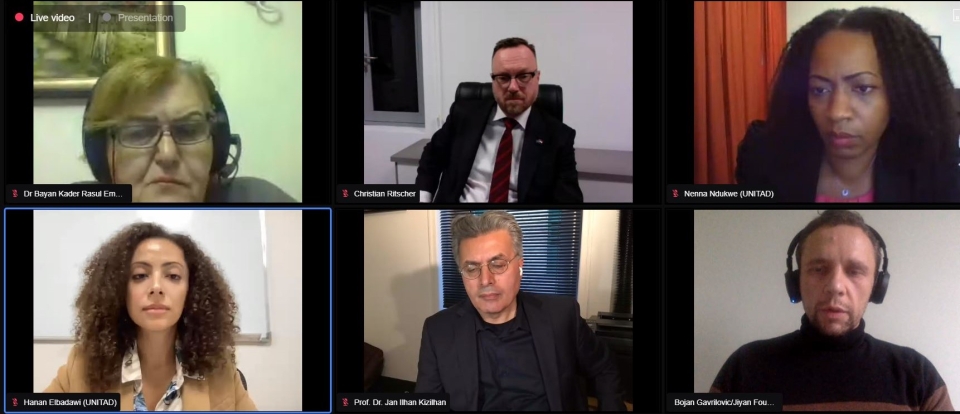UNITAD-NGO Dialogue Forum holds its Third Thematic Roundtable, 'Psychosocial Support: Engaging Survivors in Accountability Efforts'

Baghdad, 18 November 2021 – Under the title: “Psychosocial Support: Engaging Survivors in Accountability Efforts”, the UNITAD-NGO Dialogue Forum held its third thematic roundtable meeting today. The events of the Dialogue Forum bring together a large number of Iraqi and international NGOs to discuss issues of relevance to UNITAD’s mandate, and to enhance cooperation, exchange ideas and best practices, and ensure that the Investigative Team can draw on the expertise and knowledge of the NGO community.
The roundtable discussed ways through which UNITAD can strengthen its cooperation with NGOs to support providing psychosocial support to victims and survivors of ISIL crimes, through extending capacity building to local NGOs and mental health providers, and challenges facing NGOs in this regard.
In his opening remarks, Special Adviser Christian Ritscher underscored the importance of cooperation between UNITAD and NGOs to fulfil the common goal of holding ISIL members accountable for their international crimes, and to serve justice to the victims and survivors from all affected communities.
The Special Adviser also highlighted the important aspect of the NGOs’ work in Iraq, including the support they extend directly to survivors. “An important aspect of the work of NGOs in Iraq is the support you are able to extend to survivors, some of whom are from your own communities, in areas like psychosocial support, which is one key area of cooperation between UNITAD and the NGO community.”
UNITAD’s lead psychologist Dr. Nenna Ndwuke briefed participants on how trauma-informed approach is central to UNITAD’s work, and how the Team’s activities focus on capacity-building and support to NGOs in this regard. She added that UNITAD works tirelessly to ensure that victims, survivors and witnesses can come forward and take part in the investigative process in an emotionally safe environment to reduce the risk of re-traumatization.
Dr. Jan Ilhan Kizilhan, Dean of the Institute of Psychotherapy and Psychotraumatology at the University of Duhok and Director of the Institute for Transcultural Health Science at the State University of Baden-Württemberg, and Dr. Bayan Kader Rasul of Emma Organization for Human Development took part in the roundtable as panelists, bringing both the international and local perspectives on the challenges and opportunities of provision of psychosocial support, with the aim of engaging survivors in accountability efforts.
Dr. Rasul provided an overview on the mental health situation in Iraq and the complex trauma reactions, elaborating on the challenges facing mental health services as well as those facing the work of NGOs in this regard.
In his intervention, Dr. Kizilhan reflected on his work with Iraqi survivors, and psychosocial support as a long-term work, stressing also the importance of accountability and pursuing justice for the mental health of survivors.
UNITAD partners with several NGOs with the aim of facilitating and increasing access to community-based psychosocial support provided by those NGOs to victims, survivors and witnesses of ISIL crimes, as an essential part of the Team’s commitment to work through a survivor-centered and trauma-informed approach.

